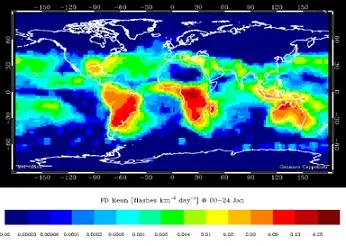 The concept of climatology can be used to refer to the set of properties and factors that characterize a certain climate . The term climate , meanwhile, refers to the atmospheric conditions that are common in an area.
The concept of climatology can be used to refer to the set of properties and factors that characterize a certain climate . The term climate , meanwhile, refers to the atmospheric conditions that are common in an area.
For example: «Due to the weather in the province, it is common for flights to be canceled in the winter season since the heavy snowfall puts planes at risk» , «This is a very popular beach destination all year round thanks to its climatology» , «Due to the climate of the region, the authorities have designed emergency operations to respond to possible intense phenomena» .
Climatology is also the scientific discipline dedicated to the analysis of climate . It is located among the Earth sciences or more precisely as a branch of geography .
Many times there is confusion between climatology and meteorology . Both are aimed at phenomena that occur in the atmosphere, although with different objectives.
Climatology seeks to understand how the climate changes over time , focusing on its long-term characteristics. Meteorology , on the other hand, aims to investigate the changes that are continuously recorded in the atmosphere, thus being able to make short-term forecasts .
This means that, thanks to climatology, we can talk about the different climates that exist on Earth , such as the polar climate or the tropical climate , for example. From the weather, meanwhile, we can know if it will rain tomorrow or what temperature is expected for the weekend.
When we talk about "long term" we really mean very long periods of time, since the climate usually maintains a certain regularity for many years. In some cases, its stability can span entire geological periods, so we are talking about tens of millions of years.
 The study of climatology requires observation of the atmosphere over a long time. The minimum period established by the World Meteorological Organization is thirty years, although some specialists say it should be longer, even more than one hundred, to obtain more reliable data .
The study of climatology requires observation of the atmosphere over a long time. The minimum period established by the World Meteorological Organization is thirty years, although some specialists say it should be longer, even more than one hundred, to obtain more reliable data .
This science, which currently enjoys an academic structure, originated like all others, from the concerns of the first scholars. In this particular case, we must mention Claudius Ptolemy , a 2nd century Greek scientist who was interested in various fields, including astronomy, mathematics and geography. One of his most important written works is precisely titled Geography , and in one of its three parts he talks about the variation in the climate of our planet that can be observed from one area to another.
Since climatology allows us to know the characteristics that the climate in each area will have for a long time until considerable changes are recorded, human beings take advantage of this knowledge to plan and develop many of their activities. Just as meteorology allows us to know if it is convenient for us to bring an umbrella to work, climatology tells us the best land to grow certain species of vegetables, for example, something that directly benefits agriculture .
In this context there is the concept of topoclimate , one that is recorded on a hillside, a city or a region, for example, and that differs from that of the area. This can take place when a geographic factor (hydrography, geomorphology, etc.) of the set of environmental conditions in which plant communities develop affects the local climate. If it cannot be subdivided, then it is called a microclimate ; for example: under the canopy of a tree or inside a room.
